Key takeaways:
- Traditional publishing offers professional support, such as editing and marketing, but can limit creative control and lead to financial uncertainty.
- Self-publishing provides creative freedom, higher royalties, and faster publishing timelines, but requires authors to manage all aspects, including marketing.
- Both publishing routes come with unique challenges, influencing the author’s experience and overall success in different ways.
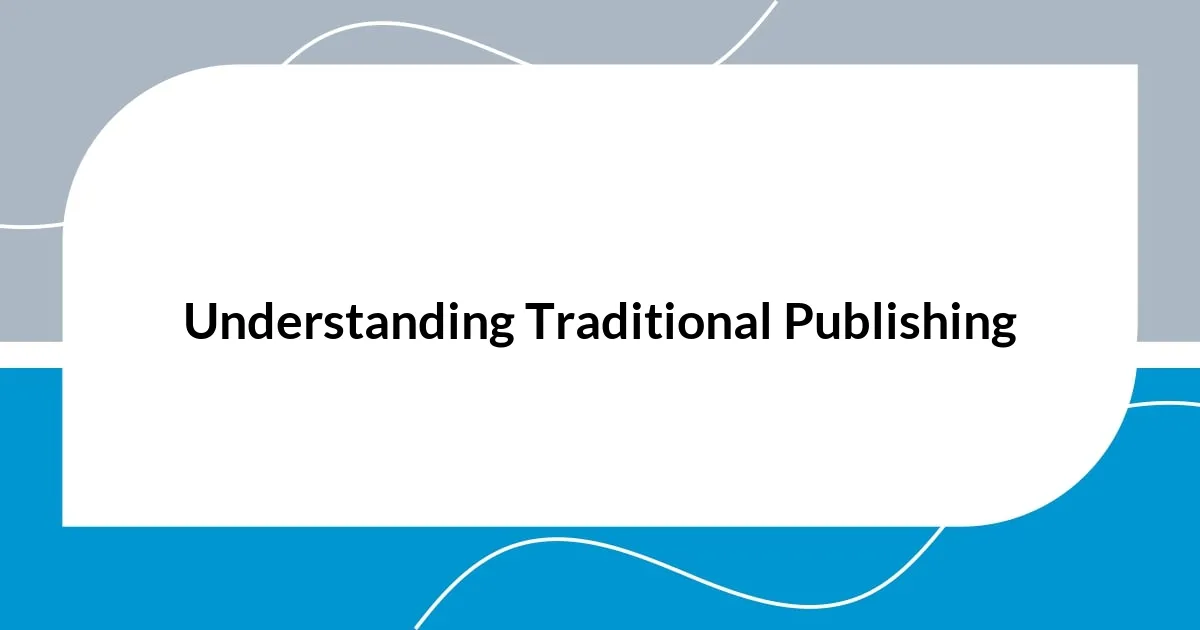
Understanding Traditional Publishing
When I think about traditional publishing, I can’t help but remember my first encounter with a literary agent. It felt a bit like dating; there was excitement mixed with nervousness as I submitted my manuscript, hoping it would capture their attention. The traditional route often requires patience, as writers must go through layers of editorial scrutiny, but that journey can lead to a polished final product that many readers end up loving.
One thing I find fascinating is how traditional publishing offers a sense of legitimacy that self-publishing can struggle with. When a big publishing house picks up your book, it can feel like you’re officially welcomed into a club. However, I often wonder: is that validation what every writer needs? For some, it’s a comforting affirmation; for others, it might restrict their creative freedom.
And then there’s the marketing side of things. Traditional publishers often have established networks and loyal reader bases, but they also tend to decide how much support you’ll receive. I remember a friend who struggled to get their book the attention it deserved, despite being with a well-known publisher. It really made me realize that even in traditional publishing, the path to success isn’t always straightforward, leading me to question the true impact of that publisher’s brand.
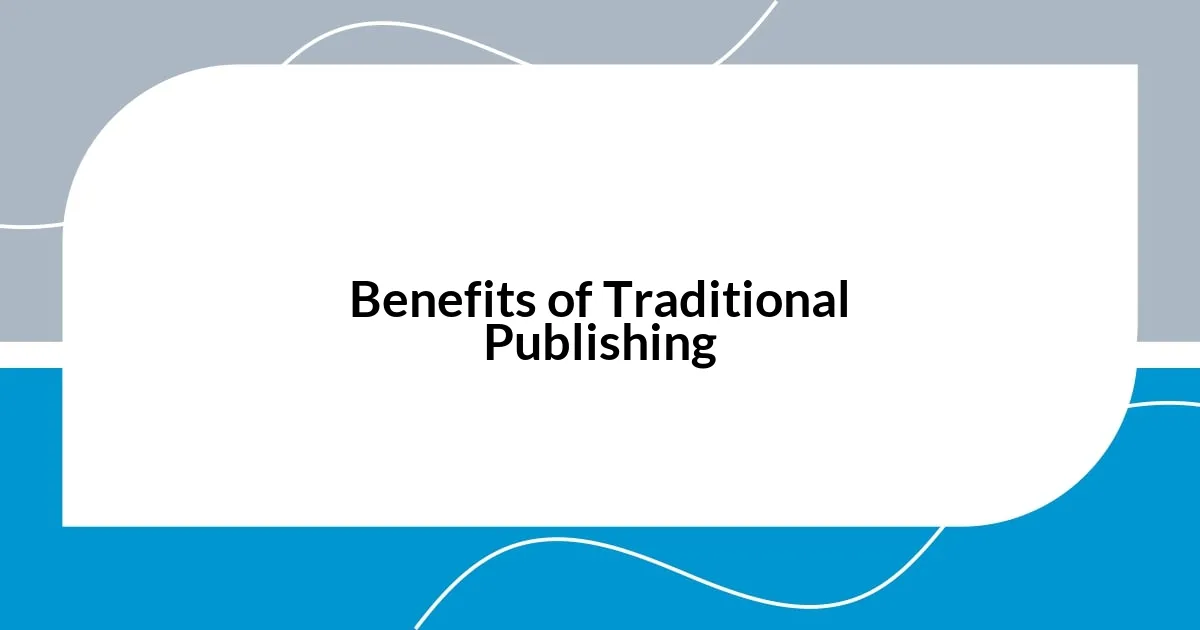
Benefits of Traditional Publishing
I’ve always appreciated that traditional publishing offers a level of support that can be hard to find elsewhere. With professionals handling editing, design, and distribution, I felt a weight lifted off my shoulders, allowing me to focus solely on my writing. In my experience, having an experienced editor review my manuscript not only enhanced the story but also provided valuable lessons about the craft itself.
- Professional Editing: Your manuscript receives thorough editing, enhancing quality and readability.
- Artwork and Design: Publishers invest in eye-catching cover designs, which can greatly impact first impressions.
- Established Distribution: Traditional houses have solid contracts with bookstores and retailers, increasing book visibility.
- Advance Payments: Authors often receive an advance on royalties, providing financial support as they focus on writing.
- Industry Connections: Publishers often provide opportunities to connect with literary agents, marketing professionals, and fellow authors, fostering a supportive network.
It’s true that while the journey may have its challenges, I’m always reminded of that feeling when my first book hit the shelves, and suddenly, the world felt a little bigger. It was marvelous to see people engaging with the work I poured my heart into, especially when there’s an entire team cheering you on behind the scenes.
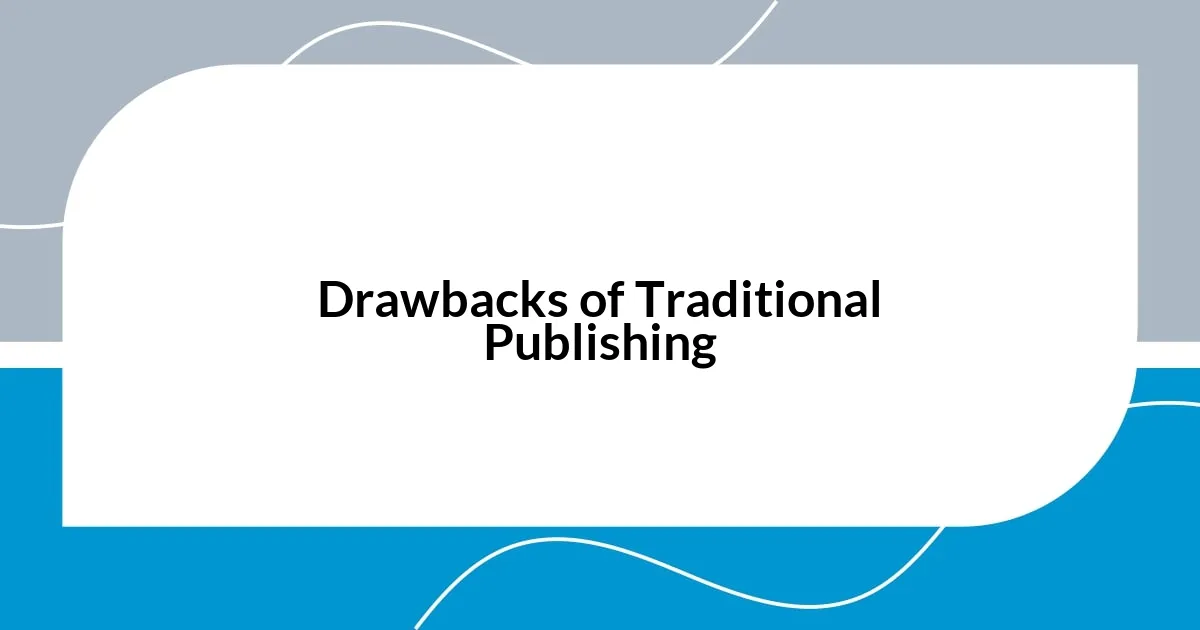
Drawbacks of Traditional Publishing
The traditional publishing route often feels like a double-edged sword. I remember submitting my manuscript, believing it was my best work yet, only to face the harsh reality of long wait times and rejection letters. It definitely taught me that the process can be painstakingly slow, as publishers can take months, if not years, to decide if they even want to pick up your book. This delays the chance for readers to experience your story, which can be incredibly frustrating.
Additionally, the loss of creative control can be a significant drawback. I spoke with an author who had to make major changes to her beloved characters to satisfy her publisher’s vision. It left her feeling disheartened, as if her original voice had been muted. This makes me think: should a writer compromise their creative vision just to fit market trends or publisher preferences? For many, like her, the answer is a resounding no.
Another aspect that cannot be overlooked is the financial uncertainty that can accompany traditional publishing. While the prospect of advance payments is appealing, I’ve learned that these amounts often come with strings attached. Many authors find themselves earning little compared to the work put in, especially after the publisher takes its cut. I’ve seen several friends celebrate their book deals only to crunch numbers later and discover that they weren’t as profitable as they had hoped. It really got me considering the true cost of traditional publishing and whether it’s worth the sacrifices.
| Drawbacks of Traditional Publishing | Description |
|---|---|
| Slow Response Times | Publishers can take a long time to respond, leaving authors in limbo. |
| Loss of Creative Control | Authors may need to compromise their vision to align with publisher demands. |
| Financial Uncertainty | Advances can be low, impacting overall earnings after the publisher’s share. |
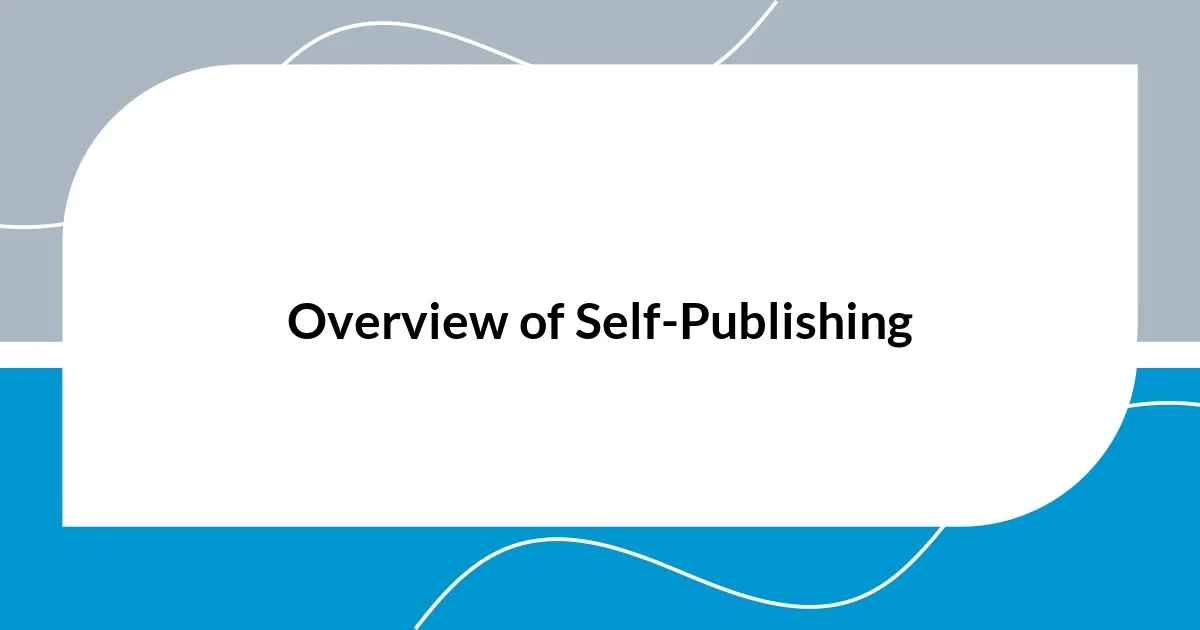
Overview of Self-Publishing
Self-publishing has truly transformed the landscape for writers like me. In the past, the idea of going it alone felt daunting, but now it’s more accessible than ever. With platforms like Amazon Kindle Direct Publishing and Smashwords, authors can publish their work almost instantly, bypassing traditional gatekeepers. This empowerment often comes with a thrilling sense of ownership; I still remember the rush I felt when I hit that “publish” button—it was like finally stepping into the spotlight after being backstage for too long.
One of the most significant advantages I’ve experienced with self-publishing is the creative freedom it offers. Unlike traditional publishing, where revisions can feel like someone erasing your fingerprints, self-publishing allows you to retain your unique voice. I once wrote a story that didn’t fit the typical mold publishers often look for, but in my heart, I believed in it. Choosing to self-publish gave me the confidence to share my vision exactly as I intended, and it was incredibly rewarding to see readers connect with it authentically.
However, self-publishing isn’t without its challenges. The responsibility of managing everything—from editing to marketing—can be overwhelming. I vividly recall spending countless nights tweaking my book cover and debating which marketing strategy to use. It’s a bit like being an octopus juggling multiple tasks at once! But honestly, that struggle made my success all the sweeter. It begs the question: does the added responsibility scare you away or motivate you to dive deeper into the craft? For me, embracing that challenge has been a crucial part of my journey in becoming a more resilient and knowledgeable author.
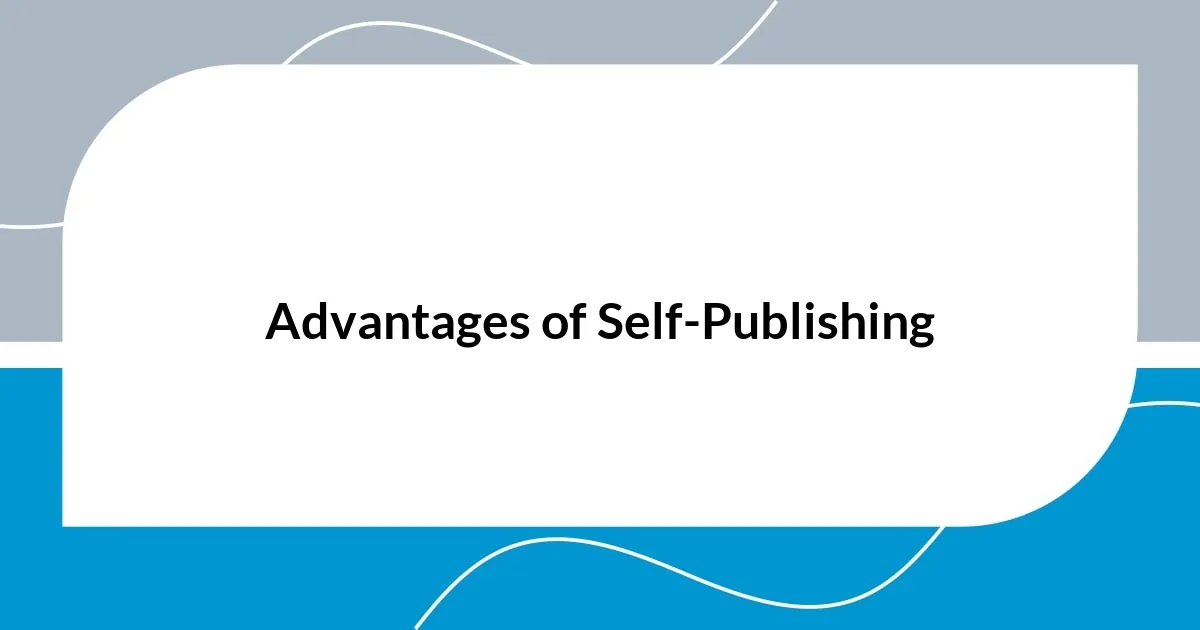
Advantages of Self-Publishing
Self-publishing carries an undeniable advantage in terms of speed. I’ll never forget the thrill of launching my book just weeks after completing the final draft. Unlike the traditional route, where I could have been waiting months or years, I had complete control over my timeline. This immediacy allowed me to respond to reader feedback and market trends almost in real-time, enhancing my overall experience as an author.
Another standout benefit is the potential for higher royalties. Traditionally published authors often grapple with meager earnings after all the publisher’s deductions. But with self-publishing, I’ve enjoyed keeping a much larger share of my profits. I remember the excitement on the day I received my first royalty statement, realizing I was earning a tidy sum each month directly from my dedicated readers. It made me realize that I was not just an author; I was also a businesswoman, overseeing my financial success.
Lastly, I cherish the ability to engage directly with my audience. Social media has made it so easy for me to connect with readers, gather feedback, and even get inspiration for my next book. I often find myself participating in discussions with fans who share my passion, and there’s something incredibly fulfilling about fostering that community. Have you ever had a conversation with someone who truly understands your work? For me, it’s these interactions that elevate the self-publishing experience from mere transactions to meaningful connections.
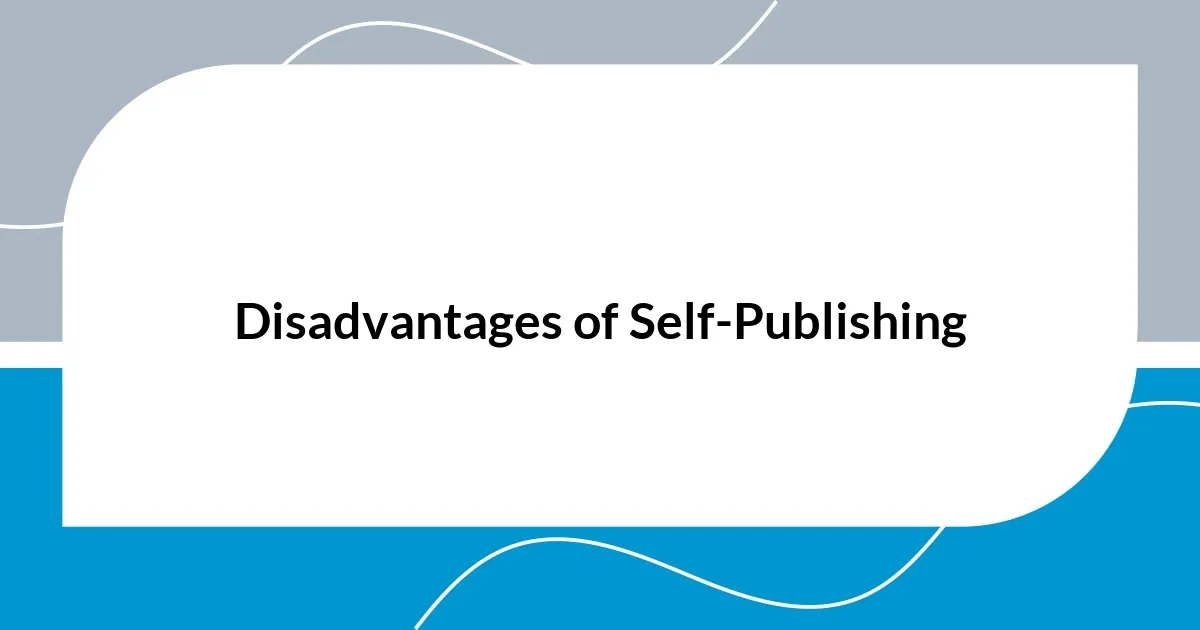
Disadvantages of Self-Publishing
Self-publishing can feel liberating, but it’s important to acknowledge its downsides. For instance, the burden of marketing can be a heavy weight to carry. I’ve often found myself staring at blank social media posts, feeling the pressure to create engaging content that resonates with readers. It made me wonder—am I more of a writer or a marketer? Balancing both roles can sometimes dilute the joy of simply crafting a story.
Another challenge is the lack of professional support. In traditional publishing, authors benefit from a dedicated team of editors and agents who navigate the complexities of the industry. I still remember the first time I sent my manuscript to an editor who really understood my voice. Transitioning to self-publishing meant pouring over my work alone, and while I learned a lot, it sometimes left me feeling isolated. Have you ever wished for a mentor when embarking on a daunting project? I know I certainly did.
Additionally, the stigma surrounding self-publishing can cast a shadow on your work. I’ve encountered skeptics who still equate self-published books with lesser quality. It’s disheartening when your hard work is dismissed simply because of its publishing route. This perception not only challenges self-published authors like me but also fuels a continuous cycle of doubt. How do you overcome this barrier? For me, it meant focusing on creating quality content and forging my own path, regardless of others’ opinions.